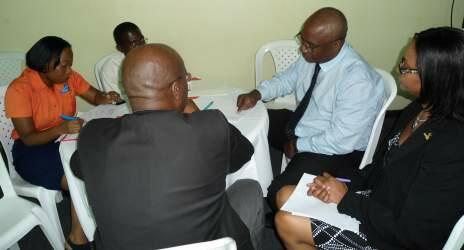
The event was a workshop and seminar hosted by the Jamaica Red Cross in collaboration with the Office of Disaster Preparedness and Emergency Management (ODPEM), under the theme of ‘Strengthening Legal Preparedness for International Disaster Assistance’. Attendees stemmed from several Ministries, Agencies, International Humanitarian Organisations and International Donors and were eager to share their perspectives on facilitating and coordinating international aid in the wake of a major disaster.
Dr. Jaslin Salmon, Vice President of the International Federation of Red Cross and Red Crescent Societies (IFRC) urged the group to ensure that Jamaica maintained its cutting edge status in regional disaster policy by integrating the content of IFRC guidelines on domestic facilitation of international disaster assistance in our legislative and policy framework. He noted that while the content of the guidelines were not binding, they were based on international treaties and reflected the lessons learnt from large-scale disasters such as those that have occurred in Japan and Haiti.
Ms. Michelle Edwards, representing the directorate of ODPEM, assured those gathered that their ideas and recommendations would influence the modifications to the Disaster Preparedness and Emergency Management Act, which is currently under review. She reiterated the agency’s support for legal mechanisms that maximize the impact of international disaster assistance while maintaining a high standard in emergency response and risk mitigation.
Participants worked throughout the day to identify gaps in the coordination of international disaster assistance, as well as barriers to the entry of relief goods, personnel and equipment. They also addressed some of the peculiar challenges that would arise in the event of a pandemic. It was clear from the workshop sessions that many of the IFRC guidelines have been met in practice, but lack the legal foundation required to make them a permanent feature of disaster relief coordination. Special waivers and other exemptions are commonly made available to those humanitarian organisations that are ongoing partners in the disaster sector. However, no set mechanisms are in place to establish partnerships with new NGOs or ad hoc donors.
Recommendations focused on translating practices into policy, and increasing the flow of information to new and existing donors. These recommendations will inform a Legislative Gap Analysis on Jamaica’s Disaster Response Law, currently being prepared by Tania Chambers on behalf of the Jamaica Red Cross. The workshop also assisted in providing detailed information on existing laws, regulations and administrative arrangements for the entry of disaster relief into the country. This data will be included in a Regional Compendium on International Disaster Response Law, an activity that is being jointly coordinated by the Ministry of Local Government and Community Development and ODPEM.